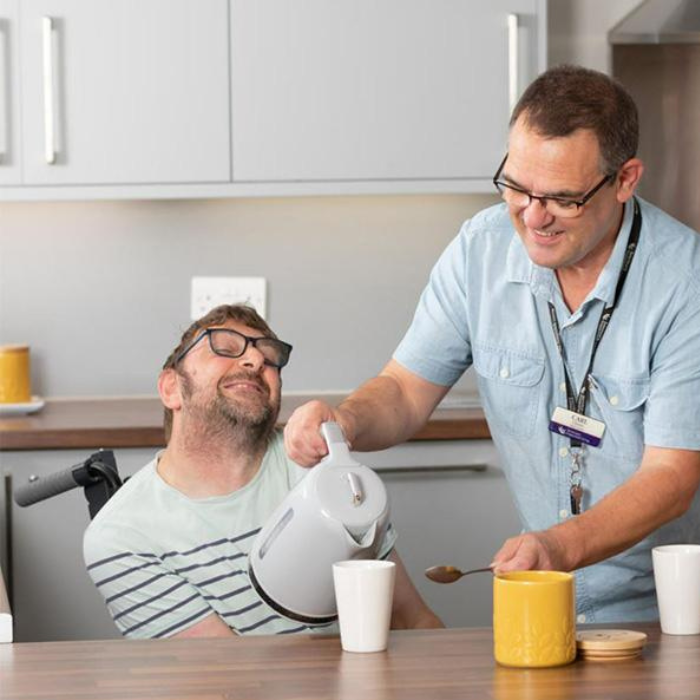Valorum Care Group has two supported living divisions – Adjuvo and Carmel Care. They provide care and support for people with physical disabilities, acquired brain injury, sensory impairment, learning disabilities, autism, and mental health issues, including behaviours that challenge, to live the lives they want in their own homes. We also offer various levels of support for people who have enduring mental health conditions.

Our Client Care Team are available to answer your questions and can assess the client and design an individualised care plan.
Contact Us Today
Valorum’s supported living services aim to support adults and young adults with learning disabilities, mental health issues and behaviours that challenge to live the lives they want in their own homes. We offer supported living services registered with the CQC in the provision of personal care. In line with Transforming Care, we support people who have learning disabilities and associated needs. This can include communication difficulties, autism, epilepsy, and physical disabilities. We support individuals with mild, moderate, and severe behaviours that challenge.
The level of support can range from several hours per day to 24 hours a day, 7 days a week with one or more support staff. We take a personalised and flexible approach by working to match our service to your needs. This enables us to tailor-make support packages that can be delivered in your own accommodation or shared accommodation. If you have an individual budget or direct payment, we can support you in deciding how best to spend your finances to make sure you can live the life you want. Where appropriate we will also work with your family, friends, advocates, and other professionals to tailor make your unique support package. The result is a plan that reflects your wishes and needs. It helps set the goals and the outcomes you want to achieve. We’ll work with you to regularly review your support plan. This ensures we’re giving you the right level of support to reach your goals.
We currently operate in Leicestershire, Gloucestershire, Essex, Devon, Cornwall, Southend, and Teesside, but we are expanding into other geographical areas in partnership with the Local Authorities and ICB. With the service users’ and or their care teams’ consent, we can refer complex service users to our own Multi-Disciplinary Team of mental health professionals, or we can support them in working closely with their local community mental health or learning disability teams.
By encouraging people to take control and have belief in their potential, we can make positive outcomes a reality for everyone, regardless of age or presumed ability. We create pathways that support individuals through residential to community living, delivering measurable outcomes for both local authorities and the people who use our services. This, paired with our personalisation agenda, enables us to help the people we support to lead fulfilled, independent lives. By working together, we can make a real and lasting difference.

We work with social landlords and housing partners who assist us in finding the right accommodation for individuals in need of housing solutions and make the adaptations necessary. As a result, we can offer varying levels of support accommodation dependent on individuals’ needs and wishes. We can offer self-contained flats and shared housing with 24-hour support staff availability. We also provide an on-call number for emergencies outside office hours.
Our team will ensure right from the beginning that each service user knows how they will be supported. After the assessment process, we will agree on how to support you. Detailed support plans will be co-produced with the full participation of the service users stating how our team will support them with all aspects of daily life to develop the skills required to live more independently.
Our Aim is to support adults and young adults with learning disabilities, mental health issues and behaviours that challenge to live the lives they want in their own homes in the community.
Our Approach
We believe that people we support should be supported to have a good and meaningful everyday life.
- Care and support should be person-centred, planned, coordinated and co-produced.
- Our service users should have choice and control over how their health needs are met.
- People with a learning disability and/or autism should be supported to live in the community.
- People we support should have a choice about where and with whom they live.
- We train our staff to support service users who present with behaviours that challenge in a personalised way.
Support Provided
- Personal Care
- Taking medication and medication management
- Emotional reassurance and mental health support
- Support with tenancy and housing benefit applications.
- Maintaining the home
- Dealing with offending issues
- Developing self-confidence
- Finances and economic well-being including budgeting and debt management.
- Domestic and living skills including Cooking Shopping and using public transport.
- Leisure, cultural and faith activities
- Employment, volunteering, education, and training
Our Client Care Team are available to answer your questions and can assess the client and design an individualised care plan.
Contact Us Today
Supported Accommodation
Supported accommodation refers to facilities that provide assistance and care to individuals living in their own tenancies who need help with daily activities due to physical or cognitive limitations. These facilities are designed to offer a comfortable and safe environment while promoting independence and quality of life. Supported accommodation options vary widely, from self-contained apartments to shared houses with communal facilities and on-site staff.
In supported accommodation, service users receive personalised care plans tailored to their unique needs. This can include assistance with bathing, dressing, medication management, meal preparation, and more. Trained staff members are available around the clock to ensure residents’ safety and well-being, offering peace of mind to residents and their families. One significant advantage of supported accommodation is the sense of community it fosters.
Residents often have the opportunity to socialise with peers and participate in group activities, which can combat loneliness and promote a fulfilling lifestyle. Additionally, a trained carer ensures that residents can access immediate help in case of emergencies or unexpected health issues.
Supported accommodation can be an excellent choice for loved ones, individuals with disabilities, or anyone in need of assistance with daily living activities. It allows individuals to maintain independence while receiving the support they require, ultimately enhancing their overall quality of life.
Emotional Support and Reassurance
Providing emotional support and reassurance to individuals facing various challenges is vital to the delivery of good supported living services. This support can encompass a wide range of issues, from mental health concerns to personal crises and emotional well-being.
Trained staff work closely with residents to address their specific needs and offer guidance in managing and overcoming emotional difficulties. These professionals create a safe and confidential environment where individuals can express their feelings, thoughts, and concerns openly. Our goal is to improve service users’ mental and emotional well-being, enhance their coping skills, and help them maintain a positive outlook on life.
Common reasons for seeking emotional support and reassurance in supported living settings include grief and loss, depression, anxiety, adjustment to life changes, family conflicts, and more. Staff can significantly improve service users’ mental health and overall quality of life by providing a listening ear, professional guidance, and effective coping strategies.
Providing emotional support and reassurance is an essential service within supported living facilities, promoting physical but also emotional and psychological well-being. It empowers individuals to navigate life’s challenges with resilience and a renewed sense of purpose.
Supporting Service Users To Access The Community
Being able to support service users to access the community is a crucial aspect of supported living. It ensures that individuals with mobility or cognitive impairments can safely navigate their local environment and access necessary services.
This involves trained staff members assisting service users in various ways, including accompanying them to medical appointments, social activities, shopping trips, and more.
Getting around can be daunting for individuals with mobility challenges or disabilities. Supporting service users helps them to maintain a sense of independence and engagement with the community. Carers provide physical support, such as helping with mobility aids or wheelchairs, as well as emotional support, offering reassurance and companionship during outings.
One of the primary benefits of supporting service users is that it enhances residents’ quality of life by allowing them to participate in activities they may otherwise miss out on. Whether it’s attending a family event, going to a favourite restaurant, or simply enjoying a stroll in the park, supporting service users ensure that individuals in supported living remain connected to their community and maintain a fulfilling lifestyle.
Moreover, this support provides peace of mind to service users and their families, knowing that reliable assistance is available when needed. It promotes social engagement, reduces isolation, and contributes to the overall well-being of those living in supported living settings.
Religion and Culture
Respecting and accommodating service users’ religion and culture is paramount in supported living. Every individual has unique spiritual and cultural beliefs integral to their identity and well-being. Supported living facilities strive to create an inclusive and culturally sensitive environment where residents can practice their faith and maintain cultural traditions.
Supported living facilities often offer various services to support service users’ religious and cultural needs. These may include designated prayer rooms, access to religious texts, transportation to religious services, and providing culturally appropriate meals. Additionally, staff members are trained to be respectful of individuals’ customs and traditions, ensuring that their preferences are honoured.
Recognising and respecting religious and cultural diversity in supported living enhances service users’ emotional and spiritual well-being and promotes a sense of belonging and community. It allows individuals to continue practising their faith and celebrating their cultural heritage, fostering a more enriching and fulfilling living experience.
Moreover, maintaining cultural and religious connections can positively impact service users’ mental and emotional health, providing comfort and a sense of purpose. supported living facilities that prioritise these aspects contribute to a more holistic approach to care, recognising that individuals’ well-being encompasses their physical health and their cultural and spiritual needs.
Training and Development
Training and development are essential components of the supported living sector, ensuring that staff members are well-prepared to provide high-quality care and support to residents. Continuous training and professional development programs empower caregivers to deliver person-centred care that meets the evolving needs of individuals living in supported care settings.
The training of staff members includes various aspects, such as:
- Personal Care Skills: Caregivers are trained in essential personal care skills, including medication management, first aid, and CPR, to ensure residents’ safety and well-being.
- Communication Skills: Effective communication is crucial in understanding and addressing residents’ needs. Training in communication skills helps caregivers build rapport and trust with residents.
- Dementia Care: Specialised training in dementia care equips staff with the knowledge and skills needed to provide compassionate care to residents with Alzheimer’s disease and other forms of dementia.
- Diversity and Inclusion: Cultural competence training ensures that caregivers are sensitive to residents’ diverse backgrounds and can provide care that respects their values and beliefs.
- Regulatory Standards: Staff members are educated on CQC standards and professional codes of conduct to maintain the highest level of integrity in their interactions with residents and their families.
- Emergency Preparedness: Caregivers are trained to respond effectively in emergency situations, ensuring the safety of residents in any unforeseen circumstances.
- Person-Centred Care: Training emphasises tailoring care plans to each resident’s unique preferences and needs, promoting dignity and autonomy.
Continuous professional development is encouraged to keep staff members up-to-date with the latest care practice advancements and foster a culture of excellence in supported living facilities.
Our Client Care Team are available to answer your questions and can assess the client and design an individualised care plan.
Contact Us Today
